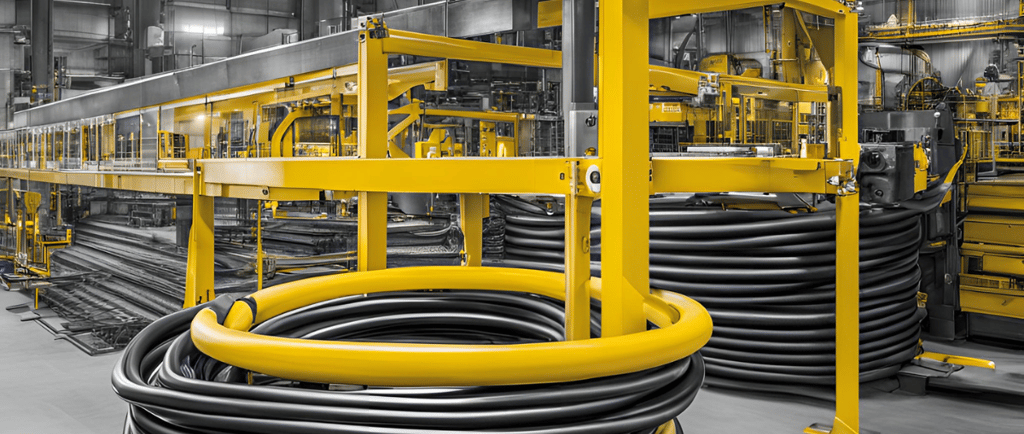Flexible Cable: Key Benefits for Industrial Environments
8/30/20243 min read


In the dynamic landscape of industrial operations, the choice of cables plays a crucial role in ensuring both the efficiency and longevity of machinery and equipment. Among the various types available, flexible cables stand out for their superior performance and adaptability. In this blog post, we will explore the key benefits of flexible cables in industrial environments, highlighting why they are becoming an essential component in modern industrial applications.
What Are Flexible Cable?
Flexible cables, also known as flexible conductors or flexible cords, are designed to be highly adaptable and resistant to mechanical stress. Unlike rigid cables, which are less accommodating to movement and bending, flexible cables can withstand repeated flexing and movement without compromising their integrity. This flexibility is achieved through the use of finely stranded conductors, which provide the necessary flexibility and durability.
1. Enhanced Durability and Longevity
One of the primary advantages of flexible cable is their enhanced durability. Industrial environments often involve harsh conditions, including high temperatures, chemical exposure, and physical stress. Flexible cable are engineered to withstand these demanding conditions better than their rigid counterparts. The ability to flex without breaking or degrading extends the lifespan of the cables and reduces the need for frequent replacements.
Key Points:
Resilience to Mechanical Stress: Flexible cable can endure repetitive bending and twisting without failure.
Resistance to Harsh Environments: They are designed to resist chemicals, temperature fluctuations, and other environmental factors.
2. Superior Performance in Dynamic Applications
In many industrial settings, machinery and equipment are subject to continuous movement and vibration. Flexible cables excel in dynamic applications where static cables might fail due to movement or mechanical stress. For instance, in robotics and automated systems, flexible cables ensure reliable performance by accommodating movement and reducing strain on connections.
Key Points:
Ideal for Moving Parts: Flexible cable are perfect for applications with continuous motion, such as robotics and conveyor systems.
Reduced Strain on Equipment: They help minimize the stress on connectors and machinery components.
3. Improved Installation and Space Efficiency
Flexible cable are also advantageous in terms of installation and space management. Their ability to bend and conform to various shapes allows for more efficient routing and less clutter. This flexibility simplifies installation in tight spaces and complex configurations, leading to quicker setup times and reduced labor costs.
Key Points:
Easier Routing: Their adaptability allows for more straightforward installation in confined or complex spaces.
Reduced Installation Time: Flexible cables can be easily maneuvered and fitted, speeding up the installation process.
4. Lower Maintenance Costs
Maintenance is a significant consideration in industrial operations. Flexible cable contribute to cost savings by reducing maintenance needs. Their durability and resistance to wear and tear mean fewer breakdowns and less frequent replacement. This not only lowers direct maintenance costs but also minimizes downtime, which can be costly for industrial operations.
Key Points:
Reduced Downtime: Less frequent cable failures lead to lower production interruptions.
Lower Replacement Costs: Durable cables mean fewer replacements and repairs.
5. Enhanced Safety
Safety is a paramount concern in any industrial environment. Flexible cable contribute to a safer workplace by reducing the risk of electrical faults and hazards. Their design ensures better insulation and protection against physical damage, reducing the likelihood of electrical shorts or fires. Moreover, their resistance to environmental factors decreases the risk of insulation degradation, further enhancing safety.
Key Points:
Better Insulation: Improved insulation helps prevent electrical faults and accidents.
Reduced Risk of Damage: Flexible cable are less likely to suffer physical damage, lowering safety risks.
6. Versatility Across Various Applications
Flexible cable are incredibly versatile and can be used in a wide range of industrial applications. From power distribution and control systems to data transmission and signal processing, flexible cables are suitable for various functions. Their adaptability makes them an ideal choice for industries such as manufacturing, automotive, aerospace, and more.
Key Points:
Wide Range of Uses: Suitable for power, control, data, and signal applications.
Adaptable to Different Industries: Effective in various sectors, including manufacturing and aerospace.
7. Long-Term Cost Savings
Investing in flexible cable can lead to significant long-term cost savings. While they may have a higher initial cost compared to rigid cables, their durability, reduced maintenance needs, and lower replacement frequency provide substantial savings over time. Additionally, their efficiency in dynamic applications can lead to enhanced productivity and reduced operational costs.
Key Points:
Initial Investment vs. Long-Term Savings: Higher upfront costs can be offset by long-term durability and reduced maintenance.
Increased Efficiency: Improved cable performance can lead to greater overall productivity.
Conclusion
In summary, flexible cable offer numerous benefits that make them a valuable asset in industrial environments. Their enhanced durability, superior performance in dynamic applications, improved installation efficiency, lower maintenance costs, enhanced safety, versatility, and long-term cost savings make them an excellent choice for a wide range of industrial applications. By investing in flexible cables, industries can ensure greater reliability, efficiency, and safety in their operations, ultimately contributing to overall success and productivity.
As industries continue to evolve and face new challenges, the role of flexible cables will only become more critical. Embracing these cables can lead to a more resilient and efficient industrial setup, paving the way for future advancements and innovations.
For more information on flexible cable and how they can benefit your industrial operations, contact us today and explore the best solutions tailored to your needs.
